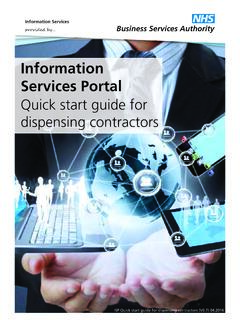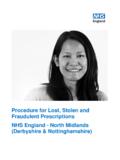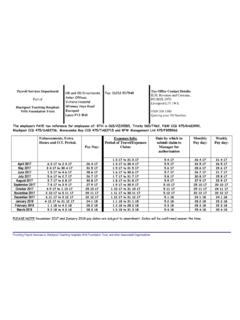Transcription of Operating department practitioner - Better With You
1 Operating department Join the team and practitioner make a difference Operating department practitioners (ODPs) are key members of the perioperative team. To practise, ODPs have to register with the Health and Care Professions Council (HCPC). They work autonomously but also with other healthcare professionals to ensure that patients receive the highest standards of care throughout their perioperative journey: preoperative assessment, admission, anaesthesia, surgery, post-anaesthesia recovery and discharge to hospital ward or home. What will you be doing? The role of the ODP is varied and dynamic;. you will be working in collaboration with surgeons, anaesthetists, nurses and the wider multi professional healthcare team to ensure patient comfort and safety. During your education, your studies will focus on three Surgical key aspects of care. In the surgical aspect of care, there are two key roles, commonly known as the scrub Anaesthetic practitioner and circulating practitioner .
2 In the anaesthetic aspect of care, you will work While the scrub practitioner forms part of in partnership with the anaesthetist; preparing the sterile Operating team, the circulating specialist equipment and communicating practitioner 's role is of equal importance effectively to assess, plan, deliver and evaluate in providing support to this team, liaising patient care. You will ensure patient wellbeing and coordinating with other areas within by providing emotional support, monitoring the care setting. Both these roles require vital signs and responding to the patient's communication skills, a detailed knowledge changing needs. of human anatomy, infection prevention and surgical techniques to provide effective support to the Operating team. The priority at all times is patient safety. Where will you work? What skills and qualities will you need? ODPs work mainly in hospital Operating caring and compassionate nature suites, but their skills are recognised and ability to work well as part of a team transferable to other areas, such as: ability to work in a pressurised and rapidly emergency departments (A&E).
3 Changing environment intensive and high dependency care settings thoughtful and conscientious approach trauma and medical emergency to working response teams good communication skills transplant teams. excellent problem solving and organisational skills Operating department practitioner Post-anaesthetic In the post-anaesthetic room, ODPs take the lead in delivering individualised patient care. This role includes ongoing assessment and support of the patient's physical, emotional and comfort needs, diagnosis, and management of changes to the patient's condition. Once the patient is stabilised and ready for discharge, the ODP will initiate and implement transfer protocols. Compassion, versatility and adaptability are key features for today's ODP, coupled with a commitment to life-long learning to allow you to continually develop your professional practice. What entry routes are available? To be eligible to apply for registration as an ODP, as a minimum, you must have undertaken the Diploma of Higher Education development.
4 ODPs are able to work in a (Dip HE) in Operating department Practice. range of specialist areas, lead multidisciplinary Many universities now offer degree level teams and develop to advanced roles, such as qualifications. These courses are offered by physician's assistant (anaesthesia) or surgical universities across the UK and will require care practitioner . a minimum of two years' study, involving both academic and clinical placement In addition to the clinical career routes, components. All ODP courses must be ODPs can also follow paths into healthcare approved by the HCPC. management and education. The NHS provides financial support to Pay eligible students on NHS-funded courses. The national pay system in the NHS is called For more information, visit Agenda for Change (AfC). This pay system applies to all NHS staff except doctors, dentists and very senior managers. Here are some Once you have your diploma or degree, examples of roles and the AfC bands at which you will need to apply for registration with they may be paid: theatre practitioner /ODP.
5 The HCPC to practise as an ODP. (band 5), theatre practitioner higher level (band 6 & 7) and theatre manager (band 8). How can you develop your career? To find out more about AfC pay bands, and Continuing professional development is to see the most up-to-date salary information, a requirement for all ODPs and there are visit exciting and diverse opportunities for career For more information about a For more information on the career as an ODP, please visit professional bodies relevant to ODPs, visit You will also find information about entry requirements and training for ODPs. You can search for current vacancies and download job descriptions at For further copies of this factsheet call 0345 60 60 655, e-mail: or visit NHSC67 May13.




![The [January 2018] Public Sector Transfer Club](/cache/preview/a/2/a/c/a/3/1/4/thumb-a2aca3146a5eaf5d87fff577a897dab7.jpg)